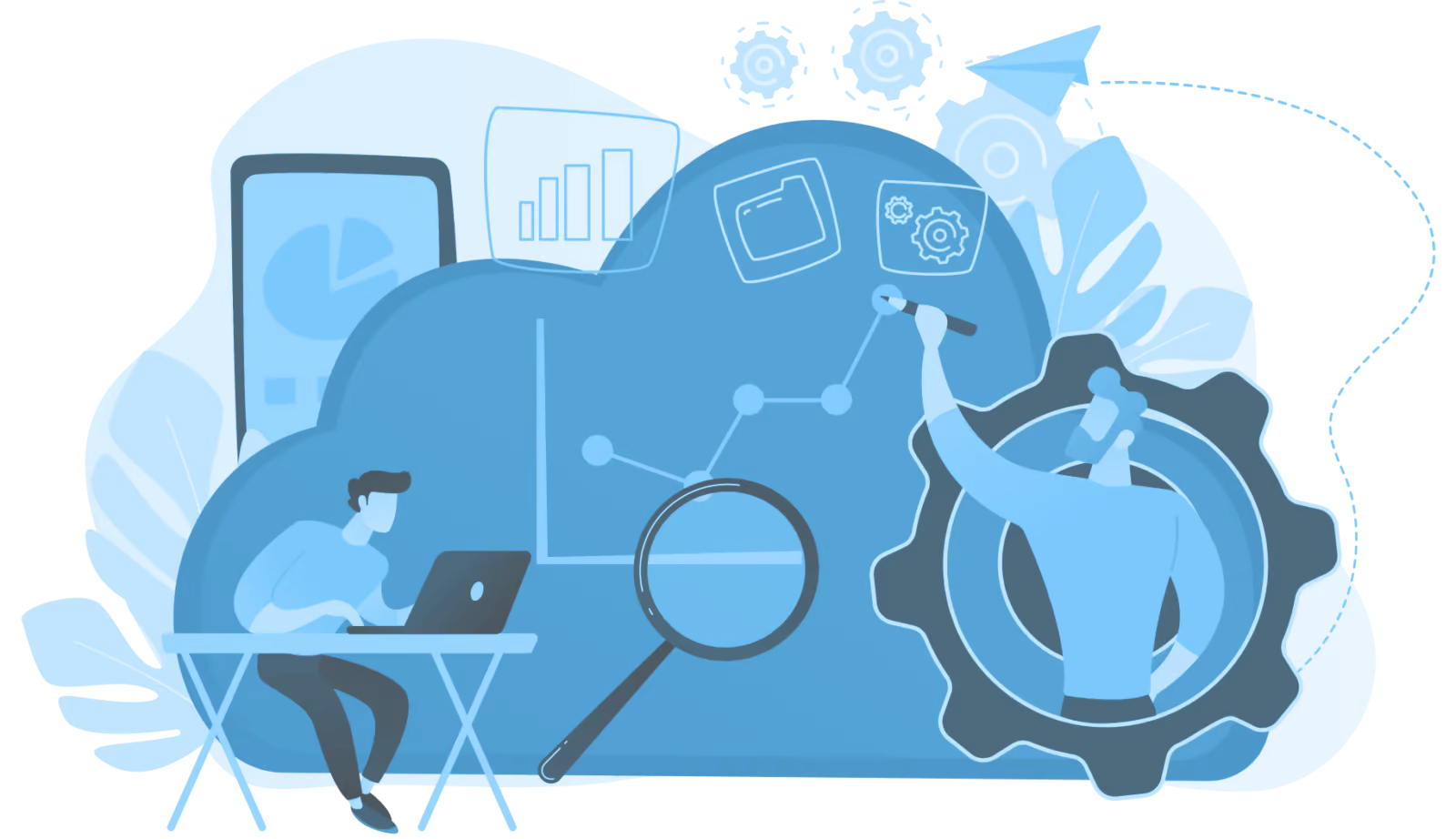Discover how intelligent enterprise systems are driving growth for businesses in the USA & UK. Learn how AI, analytics, cloud, and integrated applications deliver agility, efficiency, and customer-centric innovation.

Introduction: Why Intelligent Enterprise Systems Matter
Intelligent Enterprise Systems are redefining how companies operate in the USA and UK. By combining AI, cloud infrastructure, and integrated business applications, these systems provide the agility, operational insight, and customer-centricity needed to compete in fast-moving markets.
-
Introduction: Why Intelligent Enterprise Systems Matter
-
Core Components of Intelligent Enterprise Systems
-
Data Platform & Analytics Backbone
-
AI, Machine Learning & Process Automation
-
Cloud, Edge & Hybrid Infrastructure
-
Integrated Business Applications
-
-
Strategic Benefits
-
Enhanced Decision-Making & Agility
-
Operational Efficiency & Cost Optimisation
-
Customer-Centric Models & Innovation
-
Scalability & Resilience
-
-
Real-World Use Cases Across Industries
-
Manufacturing & Supply Chain
-
Financial Services & Insurance
-
Retail & eCommerce
-
Healthcare & Life Sciences
-
-
Implementation Considerations & Best Practices
-
Strategy, Governance & Culture
-
Data Quality, Integration & Security
-
Selecting Technology Stacks & Vendor Partnerships
-
-
Measuring Success: KPIs
-
Challenges & Risk Mitigation
-
Overcoming Silos & Legacy Inertia
-
Managing Change, Talent & Alignment
-
Ethical AI & Compliance
-
Ensuring ROI
-
-
Future Trends
-
Autonomous Systems & Continuous Intelligence
-
Edge-AI, Digital Twins & Real-Time Decision Fabric
-
Platform Ecosystems & Intelligent Business Networks
-
Conclusion: Leading with Intelligent Enterprise Systems
In an era defined by turbulent markets, accelerating customer expectations and exponential data growth, business leaders in both the USA and the UK are looking beyond traditional enterprise software. They are seeking intelligent enterprise systems—architectures and platforms built not only to run core operations, but to sense, adapt and optimize in real-time.
An intelligent enterprise system leverages data assets, artificial intelligence (AI), machine learning (ML), cloud and edge technologies, and integrated applications to deliver strategic advantage. “Intelligent enterprise” is described as an organisation that uses its data and technology effectively to achieve outcomes faster and with less risk.
For companies in the USA & UK, where competitive differentiation is increasingly tied to agility, digital experience and operational resilience, deploying intelligent enterprise systems is no longer optional—it is foundational.

Data Platform & Analytics Backbone
At the heart of any intelligent enterprise system is a unified data platform—one that captures information from across business units, applications and external sources, and makes it available for analytics, decision-making and automation. According to definitions, enterprise intelligence involves integrating technologies, tools and methodologies to optimise processes and support better decisions
This platform enables organisations to break down data silos, apply real-time analytics and create shared visibility across the enterprise.
AI, Machine Learning & Process Automation
Intelligent enterprise systems incorporate AI/ML models to identify patterns, predict outcomes and automate decision-making. For example, companies can apply ML to demand forecasting, predictive maintenance, customer-churn modelling or automated finance workflows. By embedding automation and cognitive intelligence, businesses move from passive systems to proactive and adaptive operations.
Cloud, Edge & Hybrid Infrastructure
Modern intelligent systems are built on scalable, resilient infrastructure. Cloud and hybrid architectures allow enterprises to deploy globally, access compute resources on-demand and respond to changing load and latency requirements. For use-cases such as manufacturing or logistics, edge computing enables near-real-time decision-making closer to sensors and devices. This flexibility underpins the responsiveness of intelligent enterprise systems.
Integrated Business Applications (ERP, CRM, SCM)
Traditional enterprise systems—ERP (Enterprise Resource Planning), CRM (Customer Relationship Management), SCM (Supply Chain Management)—form the digital core. Intelligent enterprise systems take this further by tightly integrating these applications with analytics, AI, data platforms and automation. This integrated stack ensures that business processes are streamlined, insights flow across functions and the enterprise operates as a cohesive, intelligent organism.
Strategic Benefits of Intelligent Enterprise Systems
Enhanced Decision-Making and Agility
By leveraging integrated data, analytics and AI, intelligent enterprise systems enable business leaders to make faster, better-informed decisions. Visibility into operations, customers and markets allows for agile responses to disruptions, competitive threats and opportunities.
Operational Efficiency & Cost Optimisation
Automated workflows, predictive analytics and streamlined processes translate into reduced operational costs, improved productivity and elimination of inefficient manual tasks. According to research, intelligent platforms increase visibility, focus and agility—key outcomes for enterprises.
Customer-Centric Business Models & Innovation
With intelligent enterprise systems, companies shift from product-centric to customer-centric models. Real-time insights enable personalised experiences, faster time-to-market and continuous innovation. In the USA & UK markets, where customer experience is a key differentiator, this capability becomes strategic.
Scalability and Resilience in Digital Disruption
Intelligent systems provide the backbone for scalable operations and business continuity. Whether facing supply-chain disruptions, regulatory changes or unpredictable market conditions, organisations backed by intelligent enterprise architecture are better positioned to adapt and thrive.
Real-World Use Cases Across Industries
Manufacturing & Supply Chain
In manufacturing, intelligent enterprise systems enable predictive maintenance, dynamic scheduling and quality optimisation. Data from sensors, production lines and logistics flows into AI-driven analytics to anticipate equipment failures and optimise maintenance cycles.
Financial Services & Insurance
In the finance and insurance sectors, intelligent systems support risk modelling, fraud detection, regulatory compliance and customer analytics. Real-time data integration and AI enable firms in the USA & UK to respond to new threats, refine underwriting and deliver personalised services.
Retail & eCommerce
For retailers and eCommerce firms, intelligent enterprise systems bring together customer, inventory and operational data. The result: hyper-personalised offers, omnichannel consistency and enhanced customer loyalty. Intelligent systems transform retail operations into data-driven competitive engines.
Healthcare & Life Sciences
In healthcare, intelligent enterprise systems are applied to health data analytics, patient management, supply-chain resilience and operational performance. By leveraging real-time data and integrated applications, healthcare organisations can improve patient outcomes and streamline enterprise operations.
Implementation Considerations & Best Practices

Strategy, Governance & Culture Shift
Implementing intelligent enterprise systems requires more than technology. It demands a strategic vision, strong governance and cultural change. Organisations must align IT and business objectives, develop a roadmap and establish governance frameworks that support continuous evolution.
Data Quality, Integration & Security
High-quality data is non-negotiable. Intelligent systems fail without accurate, timely and integrated data flows. Also, robust security, privacy and compliance frameworks (such as GDPR in the UK, CCPA in the USA) are essential to protect business and customer trust.
Selecting Technology Stacks and Vendor Partnerships
Choosing the right technology stack, cloud partner and software vendor is critical. Intelligent enterprise systems often involve microservices, APIs, hybrid cloud, AI tools and real-time analytics platforms. Selecting partners with a track-record of delivering complex architectures in USA/UK contexts can reduce risk.
Measuring Success: KPIs for Intelligent Enterprise Systems
Key performance indicators may include: time to decision, cost per business process, first-time resolution rate, customer-experience scores, system uptime, innovation velocity and ROI on analytics investment. Tracking these KPIs ensures the architecture delivers business value.
Challenges & Risk Mitigation

Overcoming Silos and Legacy Inertia
Many enterprises struggle to replace aging systems and to break down organisational silos. Intelligent enterprise systems require cross-functional collaboration and architecture modernisation. A phased migration strategy, pilot programmes and executive sponsorship are best practices.
Managing Change, Talent and Alignment
Successful deployment depends on skilled talent, change management and user adoption. Training, clear communication and ongoing support help enterprises shift from old paradigms to intelligent operations.
Ethical AI, Compliance and Responsible Systems
As AI and automation become pervasive, organisations must address ethics, bias, transparency and accountability. Responsible intelligent enterprise systems embed ethical frameworks, auditability and governance.
Risk of Over-Promise: Ensuring ROI
The promise of intelligent enterprise systems is high, but so are expectations. Without clear use-cases, business alignment and roadmap, investments may underperform. Mitigation: start small, measure early, scale with proven success.
Future Trends in Intelligent Enterprise Systems

Autonomous Systems & Continuous Intelligence
The next generation of intelligent enterprise systems will leverage autonomous decision-making, self-optimising processes and continuous intelligence—where systems learn, adapt and act dynamically with minimal human intervention.
Edge-AI, Digital Twins & Real-Time Decision Fabric
Edge computing, digital twins and real-time decision frameworks are becoming integral to intelligent enterprise systems, especially in manufacturing, logistics and IoT-driven industries.
Platform Ecosystems & Intelligent Business Networks
Enterprises will shift from isolated systems to ecosystem-oriented architectures—business networks where data, intelligence and capabilities flow across organisations, partners and platforms.
What USA & UK Businesses Should Be Prepared For
In both the USA and UK markets, business leaders should anticipate increased regulatory complexity, evolving data-privacy norms, supply-chain disruptions and talent scarcity. Intelligent enterprise systems can serve as strategic enablers to navigate this environment.
Conclusion
Intelligent enterprise systems represent the next frontier in how organisations operate, compete and innovate. For businesses in the USA and UK, deploying these systems is not simply an advantage—it is a necessity.
By fusing data, AI, cloud infrastructure and integrated applications into a unified intelligent architecture, organisations can deliver agility, resilience and customer-centric value in a fast-moving world.
Business leaders should begin by clarifying their vision, building a roadmap, securing executive sponsorship, selecting the right technology partners and measuring value. The era of the intelligent enterprise has arrived—those who are prepared will lead.
Final Note
By embedding the term “intelligent enterprise systems” in the title, subheadings and throughout the article, we maximise SEO relevance. The article is tailored for USA/UK audiences, emphasises trending enterprise-grade concepts and provides actionable insights to leaders and decision-makers.


